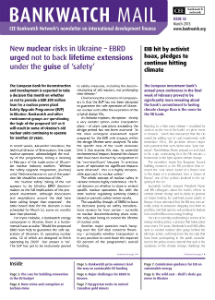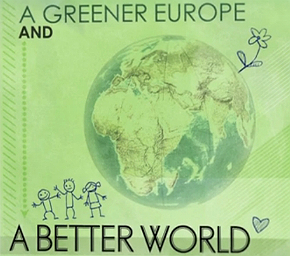Win win win – CEE public show how to inject quality into EU funded projects

Bankwatch Mail | 7 March 2013
Bankwatch’s competition devoted to showcasing ideas for EU funds investments that can generate sustainable development for European communities has proved to be a big success – and it should offer inspiration to EU and national level decision-makers as the task of setting operational programmes, the blueprints for how to spend the EUR 960 billion pot for the 2014-2020 budgetary period, now gets underway.

This article is from Issue 55 of our quarterly newsletter Bankwatch Mail
Browse all articles on the right
Coverage of the EU budget negotiations in the last year has tended to focus exclusively on the ‘big-numbers game’. There has been an alarming lack of media attention given to the voices of those who can and do benefit from EU funded projects. Indeed as our competition entrants have shown, there is tremendous appetite for direct public engagement in the formulation of EU projects that can serve local community needs.
In the second half of 2012 we sought ideas for projects that could best contribute to sustainable development in central and eastern European communities. The results suggest that supposed EU fatigue may well be yet another ‘Euro myth’. Our national campaigners who closely follow the use of EU money in their respective countries were surprised – and inspired – not only by the number of project ideas that were submitted, but also by their inherent quality.
Read more
See a list of all winning projects of Bankwatch’s Better Ideas competition
See interviews with competition winners on our YouTube channel
A greener EU budget to exit the crisis
The final award ceremony took place in Brussels last month, where the competition winners gathered to describe their ideas and how EU funding can benefit their countries. EU funds decision-makers would do well to take note.
Prize-winning projects
Bulgaria
The mountain bike park ‘Hissarya’ project in central Bulgaria aims to develop three mountain bike routes: a short length route for beginners and nature lovers, a 4-5 hour route for professionals and an all day long tour, combined with sightseeing.
The urban solar charger project aims to charge any portable electronic devices while users are resting on a bench and surfing the Internet. Four such chargers could be built and deployed using the EUR 1000 award.
The city park bees project will be implemented on the roof of a public building in one of the many parks in the Bulgarian capital, Sofia. Workshops for both children and adults will be run by professional beekeepers, biology teachers and volunteers. Children will be given the opportunity to produce honey themselves. An interview with one of the organisers below:
Croatia
The ‘Bicycles save trees’ project involves a low-carbon separate waste collection system in the city of Koprivnica. The concept is based on individual waste pick-up with bicycles on demand from the users of the service. The service is provided for free and is entirely financed by the selling of the collected materials. The main beneficial impacts of the project are reduced consumption, CO2 reductions, and saving trees for paper production.
The Urban gardening in Zagreb project aims to establish shared urban gardens, where the residents of large residential buildings can have access to land for growing vegetables. The project will reduce the distance for food transport and enable Zagreb’s citizens to produce their own healthy food under the supervision of experienced producers. An interview with one of the organisers below:
The Karlovac waste recycling project aims to tackle the fact that waste collection is impossible for modern motor vehicles in the city’s old historic town area. The NGO involved will collect recycled waste on a voluntary basis and transfer it to recycling companies.
Czech Republic
A community garden scheme in Stredokluky that promises to create jobs in a rural area, provide local, ecological food and restore land and biodiversity.
Hungary
The Mend it yourself! project in Pécs aims to show young people how they can implement sustainability in their own lives, how they can use and repair old, out-of-order tools, toys, household machines and bikes in alternative ways. Thus they can develop their social competences and other skills suitable for everyday community life and for securing employment.
The tree-planting project along channels to develop local energy production and promote the conservation of biodiversity in Derekegyház. Along drainage channels owned by the local government and operated by a water management company, the project promoters plan to plant trees of local origin. This would contribute to the conservation of biodiversity, provide employment in the local community, increase forest areas, decrease loss of water due to evaporation and provide raw material for the heating of local public buildings. This will reduce dependency on foreign energy sources and increase local energy sovereignty.
Latvia
The Eco-thoughts express project in Riebiņi aims to increase environmental awareness among children and youngsters and help mobilise them to deal with global environmental challenges while contributing to local sustainable development. The ideas and activities have been developed by youngsters themselves and they include the production of information materials and drawing books, giving thematic lectures and regularly organising events in the county’s schools.
The Footbridges for bird-watching project in Liepāja city will develop footbridges and set up information billboards in Lake Liepāja in order to encourage people to learn about nature in the city, do bird-watching and find new ways of balancing human and natural needs.
Macedonia
The ‘Meteo’ sensor boxes project in Skopje aims to provide free and easily accessible information related to environmental pollution. The NGO Free Software has designed a special box containing custom selected sensors that can measure various environmental parameters. The boxes can be placed anywhere, as long as they have internet access. The project is a direct result of the city of Skopje’s inability last year to cope with huge air pollution, that resulted in an increased number of deaths due to air pollution. The project can be implemented by municipalities at the local level and it will not only increase information flows for the public but also provide the necessary push for municipalities to deal with air pollution locally.
Poland
The Centre for eco-passive building technologies in Kock would offer consulting, training and the production of eco-passive building technology, and would employ around 15-20 people.
The Rainwater for a rainy day project aims to construct four reservoirs for rainwater located close to three settlements in Krzeszowice. The project’s main aim is to solve the problem of temporary water shortages that occur in the region mostly from spring to autumn. During the draught period inhabitants would be able to collect water from the reservoirs and use it in their daily farm work. In total the system should supply water to 40 households and 15 small farms.
Slovakia
The ‘Village jumble sale’ project aims to create a roofed market place, a sort of jumble sale where members of the public can bring unused items (e.g. old tables, chairs, TVs, radios, washing machines, etc.) in order to prevent items ending up in waste collection points, scrapyards or even illegal dumps. As a result, the amount of waste in the region will be reduced.
The Rail cycle-park Bratislava branch project features an old neglected train station that would be cleaned and revitalised. The aim of the project is to create a cycle track in the station between the tracks to ease the traffic in that part of town, to plant trees to improve the environment and renovate the building and create a new community and cultural centre while maintaining the spirit of railways. Furthermore, a small community vegetable garden with composting potential would be installed to motivate people to produce their own food, recycle and make use of biological waste.
Find out more
See more video clip interviews with competition winners on our YouTube channel
Theme: Energy & climate | Transport | Resource efficiency | Social & economic impacts
Tags: BW Mail 55 | EU budget | citizeneconomy
Never miss an update
We expose the risks of international public finance and bring critical updates from the ground. We believe that the billions of public money should work for people and the environment.
STAY INFORMED

